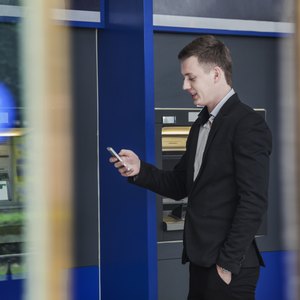
The amount of time it takes to transfer money depends on the service you use. Wire transfers are the fastest method, but also typically include fees. Bank-to-bank transfers and digital transfers are other options that take a little longer. Deciding which service to use depends on what type of financial institution you're working with and how quickly your recipient needs the money.
About Wire Transfers
A wire transfer is a method for transferring money between different financial institutions. When wired, the money is sent through the a system such as the Federal Reserve or the Clearing House Interbank Payments System, and includes a fee. Wire transfers are typically fast, with money arriving within half a business day. Depending on the institution, transfers can be requested in person, on the phone or online.
Digital Company Transfers
Transferring money from a digital institution, such as PayPal, to a bank or vice versa typically takes longer than a wire transfer. The processing time depends on the company. For PayPal, the time is three to five days. However, for Stripe, the first transfer is seven days – 10 days if sent internationally – with later payments typically taking two business days.
Bank-to-Bank Transfers
You can also transfer money from bank to bank without using a wire service. These are typically done either at a bank branch, online, through a mobile app or by phone. Non-wire transfers take longer, about three business days, to process. Some banks will allow you to expedite a funds transfer to the same institution after you've already done one transfer. But keep in mind that many banks, such as Bank of America, have a transfer fee for the ability to do so.
Bank-to-Person Transfers
Many banks also offer an option for wiring money directly to another person rather than to a recipient's bank account. With this method, you just need to know the recipient's email address or, in some cases, phone number. If the recipient has a bank account at the same institution, he may be able to receive the money as quickly as within one day. If his account is at a different institution, the process may take two to three business days. Banks typically have a deadline for recipients to accept the transfer before the money reverts back to the original account.
Transferring to an International Bank Account
If you're transferring money internationally, the processing time depends on the country you're sending money to and the bank you're working with. For wire transfers, the process can still be fast, occurring within one to two business days. However, transfers may be longer for a country that is designated slow-to-pay.
References
- Consumers Credit Union: Wire Transfer FAQs
- PayPal: FAQ -- How Long Does It Take to Transfer Money
- Wells Fargo: Transfers Questions
- Bank of America: Wire Transfers
- Finder: Bank of America international money transfers – December 2018
- Consumer Financial Protection Bureau. "Your Mortgage Closing Checklist," Page 2. Accessed May 18, 2020.
- Wells Fargo. "The Ins and Outs of Wire Transfers." Accessed May 18, 2020.
- U.S. Department of the Treasury Financial Crimes Enforcement Network. "Appendix D - Fundamentals of the Funds Transfer Process," Pages 58–63. Accessed May 18, 2020.
- Consumer Financial Protection Bureau. "What Is a Wire Transfer?" Accessed May 18, 2020.
- Consumer Financial Protection Bureau. "What Is a Remittance Transfer?" Accessed May 18, 2020.
- American Express. "7 Answers About Wire Transfers Every CFO Should Know." Accessed May 18, 2020.
- Capital One. "Checking That Goes Wherever Your Business Takes You." Accessed May 18, 2020.
- Fidelity. "Transfer Money/Shares - Frequently Asked Questions." Accessed May 18, 2020.
- Chase Bank. "Wire Transfers From Chase." Accessed May 18, 2020.
- Teacher's Credit Union. "Wire Transfers." Accessed May 18, 2020.
- Headway Capital. "ACH vs. Credit vs. EFT vs. Wire Transfer: Which Should You Use?" Accessed May 18, 2020.
- Federal Trade Commission. "Don't Bank on That Check." Accessed May 18, 2020.
- Federal Deposit Insurance Corporation. "Rules for Banks." Accessed May 18, 2020.
- Federal Trade Commission. "Protect Your Mortgage Closing From Scammers." Accessed May 18, 2020.
- Consumer Financial Protection Bureau. "Can I Cancel a Money Transfer?" Accessed May 18, 2020.
- Western Union. "When Will My Receiver Get the Money?" Accessed May 18, 2020.
- Western Union. "Send Money in Person." Accessed May 18, 2020.
- Nacha. "Same Day ACH: Moving Payments Faster (Phase 1)." Accessed May 18, 2020.
- Wells Fargo. "Six Things You May Not Know About the ACH Network." Accessed May 18, 2020.
- Popmoney. "Fees and Limits." Accessed May 18, 2020.
Writer Bio
With features published by media such as Business Week and Fox News, Stephanie Dube Dwilson is an accomplished writer with a law degree and a master's in science and technology journalism. She has written for law firms, public relations and marketing agencies, science and technology websites, and business magazines.

